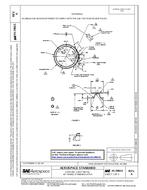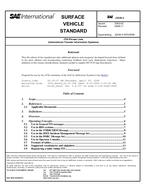Click here to purchase
This SAE Information Report describes common practices for design of battery systems for vehicles that utilize a rechargeable battery to provide or recover all or some traction energy for an electric drive system. It includes product description, physical requirements, electrical requirements, environmental requirements, safety requirements, storage and shipment characteristics, and labeling requirements. It also covers termination, retention, venting system, thermal management, and other features. This document does describe guidelines in proper packaging of the battery to meet the crash performance criteria detailed in SAE J1766. Also described are the normal and abnormal conditions that may be encountered in operation of a battery pack system –Purpose This document provides the guidelines for designing a battery system to package into manufacturer’s electric drive vehicles. It lays the foundation for electric vehicle battery systems and provides information to assist in developing a robust battery system. –Field of Application This document applies to vehicles using electrically rechargeable storage traction batteries that provides energy and power to an electric drive system for propulsion, namely Electric Vehicles and some Hybrid Electric Vehicles. This document does not fully address all guidelines for mechanically rechargeable battery systems. Users of mechanically recharged batteries should evaluate applicability of individual sections of this document. –Product Classification The battery system is a vehicle subsystem that provides all or some of the traction power and energy for vehicles using electric drive systems. This document does not apply to low voltage non-traction battery supply systems. Product Description A battery system is the complete set of assemblies required to supply traction power and energy to an electric vehicle drive system. A battery pack is a single assembly with batteries that is part of a Battery System. In some cases a single pack may comprise the complete Battery System. Electric Drive vehicles may require an electrically rechargeable secondary battery to provide motive traction power and energy as well as power and energy for incidental loads like power steering, heating and air conditioning, FMVSS mandated exterior lighting, controls, customer convenience features, etc. The battery can also represent a significant physical load to the vehicle in terms of mass, volume, and controls complexity. Consequently, the battery exerts a significant factor in vehicle design.
Product Details
- Published:
- 11/15/2000
- File Size:
- 1 file , 49 KB


